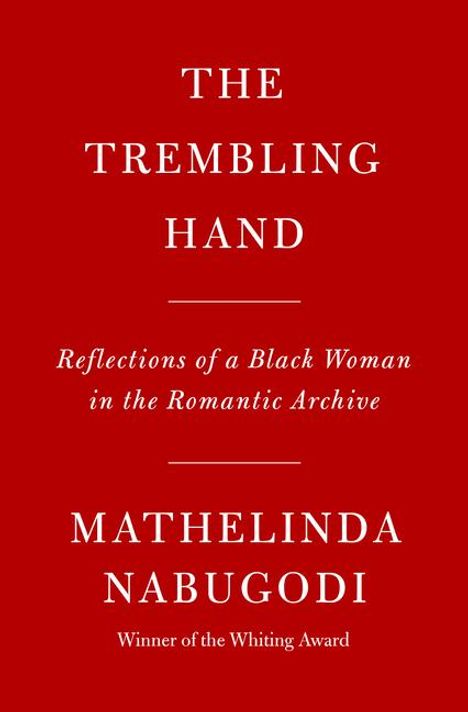Mathelinda Nabugodi: The Trembling Hand, Gebunden
The Trembling Hand
- Reflections of a Black Woman in the Romantic Archive
(soweit verfügbar beim Lieferanten)
- Verlag:
- Knopf Doubleday Publishing Group, 07/2025
- Einband:
- Gebunden
- Sprache:
- Englisch
- ISBN-13:
- 9780593536469
- Artikelnummer:
- 12069615
- Umfang:
- 432 Seiten
- Gewicht:
- 503 g
- Maße:
- 235 x 156 mm
- Stärke:
- 19 mm
- Erscheinungstermin:
- 29.7.2025
- Hinweis
-
Achtung: Artikel ist nicht in deutscher Sprache!
Weitere Ausgaben von The Trembling Hand |
Preis |
|---|---|
| Buch, Gebunden, Englisch | EUR 19,93* |
| Buch, Kartoniert / Broschiert, Englisch | EUR 15,96* |
Klappentext
A provocative, revelatory history of British Romanticism that examines the impact of the transatlantic slave economy on the lives and times of some of our most beloved poets--with urgent lessons for today
"[P]owerful, revelatory. . . . [A]s a writer Nabugodi is warm and witty, her prose both intimate and animated. . . . A masterpiece." --Kerri Arsenault, The Boston Globe
" One will never look at these poets in quite the same way." --Michael Gorra, New York Times
A scrap of Coleridge's handwriting. The sugar that Wordsworth stirred into his teacup. A bracelet made of Mary Shelley's hair. Percy Shelley's gilded baby rattle. The death mask preserving Keats's calm face. Byron's silk-lined leather boot. Who would have known there could be vast worlds contained in these items? In a completely new interpretation of the Romantics and their context, Whiting Award-winning scholar and literary sleuth Mathelinda Nabugodi uses these items to frame her interrogation of the poets, leading us on an expansive journey through time and memory, situating us in depth of their world, and her own.
"Freedom, liberty, autonomy are the period's favorite words," Nabugodi writes. Romantic poets sought truth in the depth of their souls and in the mind's unbounded regions. Ideals of free speech and human rights were being forged. And yet the period was defined by a relentless commitment to the displacement and stolen labor of millions. Romanticism, she argues, can no longer be discussed without the racial violence with which it was complicit. Still, rather than using this idea to rehash Black pain and subjugation, she mines the archives for instances of resistance, beauty, and joy.
Nabugodi moves effortlessly between the past and present. She takes us into the physical archives and, with startling clarity, unpacks her relationships with them: what they are and should be; who built them; how they are entwined with an industry that was the antithesis of freedom; and how she feels holding the materials needed to write this book, as a someone whose ancestry is largely absent from their ledgers.
The Trembling Hand presents a dazzling new way of reading the past. This transfixing, evocative book reframes not only the lives of the legendary Romantics, but also their poetry and the very era in which they lived. It is a reckoning with art, archives, and academia bound to echo through the conversation for a long time to come.


